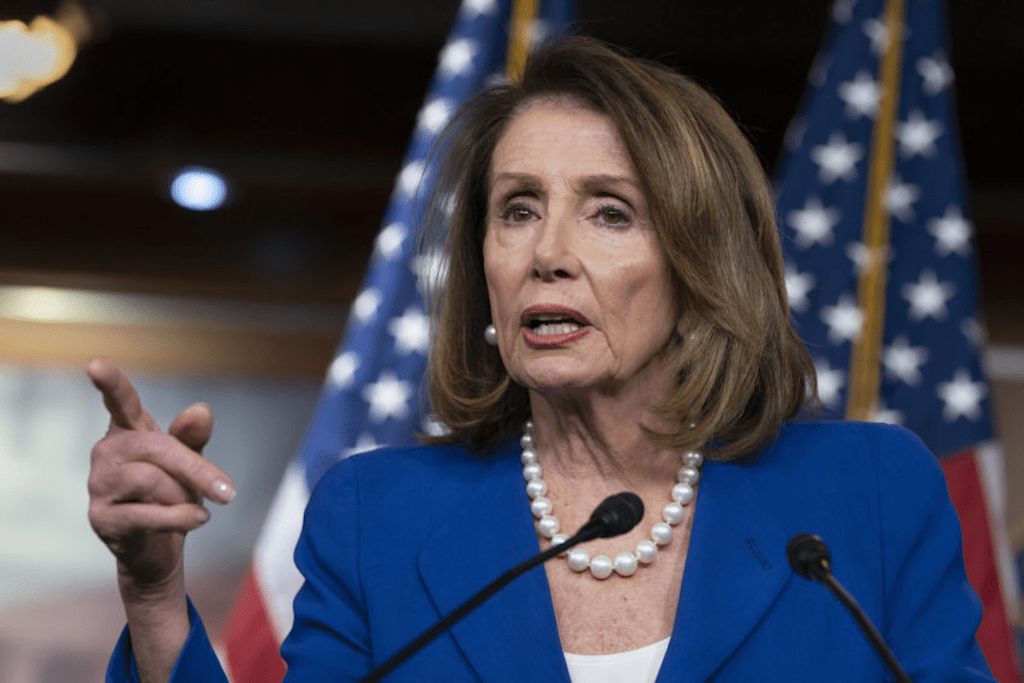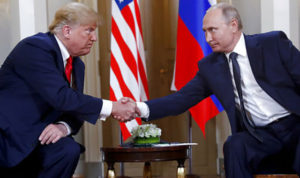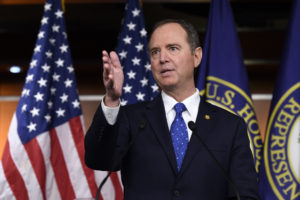Nancy Pelosi Believes in Nothing
The House speaker's apparent refusal to impeach the president has laid bare a curious void at the heart of her party’s politics. Speaker of the House Nancy Pelosi, D-Calif. (J. Scott Applewhite / AP)
Speaker of the House Nancy Pelosi, D-Calif. (J. Scott Applewhite / AP)
Last month, Nancy Pelosi gave an interview to the Washington Post that incensed an increasingly socialist flank of the Democratic Party. “I don’t think we should go down that path,” she said of President Trump’s possible impeachment, before adding the president of the United States is “just not worth it.”
It was unclear, in this context, what “worth it” meant to Pelosi. In the same interview, she claimed that Trump was unfit for office “ethically,” “intellectually” and “curiosity-wise.” So “worth it,” it seems, translated to “politically advantageous.” From this, one might draw the conclusion that the Speaker of the House thinks it better to keep this guy around—a far cry from newly elected Rep. Rashida Tlaib’s pledge several months before to “impeach the motherfucker.”
Pelosi regretted the negativity of her tone in describing the president. “I don’t usually talk about him this much,” she offered. “This is the most I’ve probably talked about him. I hardly ever talk about him. You know, it’s not about him.” Rather it’s about “lower health-care costs, bigger paychecks, cleaner government.” What exactly that “it” is remains unclear.
Her critics have seized on her impeachment language, but Pelosi gave a more telling answer in her reply to the question that immediately preceded it. Asked whether Trump had done any good for the country, she replied:
He’s been a great organizer for Democrats, a great fundraiser for Democrats and a great mobilizer at the grass-roots level for Democrats. [Laughs.] And I think that’s good for America.
A great organizer; a great fundraiser; a great mobilizer. If you are in the business of running the Democratic Party, then Donald Trump is good for business.
A few weeks later, the Mueller investigation concluded with a whimper. The former g-man had been lionized by a core of Hillary Clinton stalwarts, who came to view him with an almost messianic fervor, parsing every new tidbit that emerged from his tight-lipped shop for hints of a grand strategy. Some seemed to legitimately expect him to march Trump out of the White House in chains—or barring that, Don Jr. out of Trump Tower in handcuffs. Fed a steady diet of conspiracy theories by cable news pundits and a coterie of online grifters, they lost their ability to distinguish Cold War fantasy from late-capitalist reality.
Then Attorney General William Barr released his four-page memo on the report, which was immediately denounced as a whitewash. Barr’s memo made two principal points: that there was no proof of a grand conspiracy between the Trump campaign and malign actors in the Russian government, and that the special prosecutor remained agnostic about the possibility of criminal obstruction of justice by the president. Given the broad legal immunities enjoyed by the executive office, Barr and his deputy, Rod Rosenstein, concluded the Department of Justice could not proceed with any prosecutions.
Members of the hashtag resistance were devastated that Mueller had seemingly failed to catch Teflon Don in the act of defiling their sacred republic, but the disappointment among Democratic leadership felt more muted: less concerned with how the investigation ended than that it had ended at all.
Democratic House leaders like Jerry Nadler and Adam Schiff have since pivoted to calling for the release of the full Mueller report. They are right to do so, as Barr has proved himself a notorious water-carrier for corrupt conservatives. It is entirely possible he slanted his abstract of the investigation’s conclusions so they’d land with the loosest, wettest possible plop.
But these tactics still feel dilatory, as did the investigation itself, which Democrats seemed perfectly content to let unspool forever, picking off petty crooks at the fringes while leaving the more grave implications of the probe—collusion, conspiracy, treason—forever unresolved. A boundless, unending investigation, after all, could have produced precisely the kind of paralysis that marred the latter years of the Obama administration.
Pelosi and her Senate counterpart, Chuck Schumer, have not been entirely ineffective at grinding the gears of the Trump administration’s policy apparatus, in as much as it has any policy apparatus to speak of. They held firm through the “partial government shutdown,” and managed to sell it pretty effectively as the fault of the president, though not without Trump’s help in hanging it around his own neck to begin with.
But in the face of demands from their own activist base that they try to actually do something, they have sought—as Democratic centrists inevitably do—to negotiate against their own best positions before they even begin. The Green New Deal? Expensive, overly broad. Medicare-for-all? Likewise, not to mention impractical and disastrous for the beloved private health insurance industry. They did pass H.R. 1, an admirable bill to protect and expand voting rights, in the House, but only after months of quibbling over censorious anti-BDS bills and symbolic condemnations of their own ranks for trumped-up charges of anti-Semitism. The legislation is, of course, doomed in the Senate.
Since their decisive turn toward neoliberalism under Bill Clinton, Democrats have reinvented themselves as a party of technocrats, embracing a kind of proceduralism that stands in stark contrast to the red-meat ideology of the GOP. Ironically, it is the lunatic asylum of the Republican Party that has produced the most successful parliamentarian in the history of the United States, Mitch McConnell.
There is a curious void at the heart of Democratic politics. It isn’t necessary to believe in some absurd, magical notion of willpower to note that at its highest level, the party seems to lack an essential, motivating will. Instead, it views itself as something more akin to a professional membership organization that has a convention in a nice hotel every few years. They are not so much an emperor without clothes—that grand, ridiculous figure for the delusions of power—as they are clothes without an emperor; a lot of nice fabric blown away in a breeze and borne aloft on someone else’s hot air.
Your support matters…Independent journalism is under threat and overshadowed by heavily funded mainstream media.
You can help level the playing field. Become a member.
Your tax-deductible contribution keeps us digging beneath the headlines to give you thought-provoking, investigative reporting and analysis that unearths what's really happening- without compromise.
Give today to support our courageous, independent journalists.






You need to be a supporter to comment.
There are currently no responses to this article.
Be the first to respond.